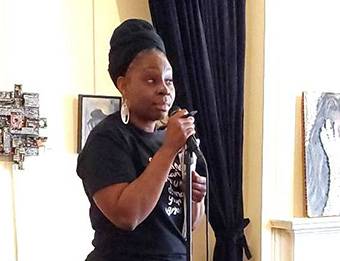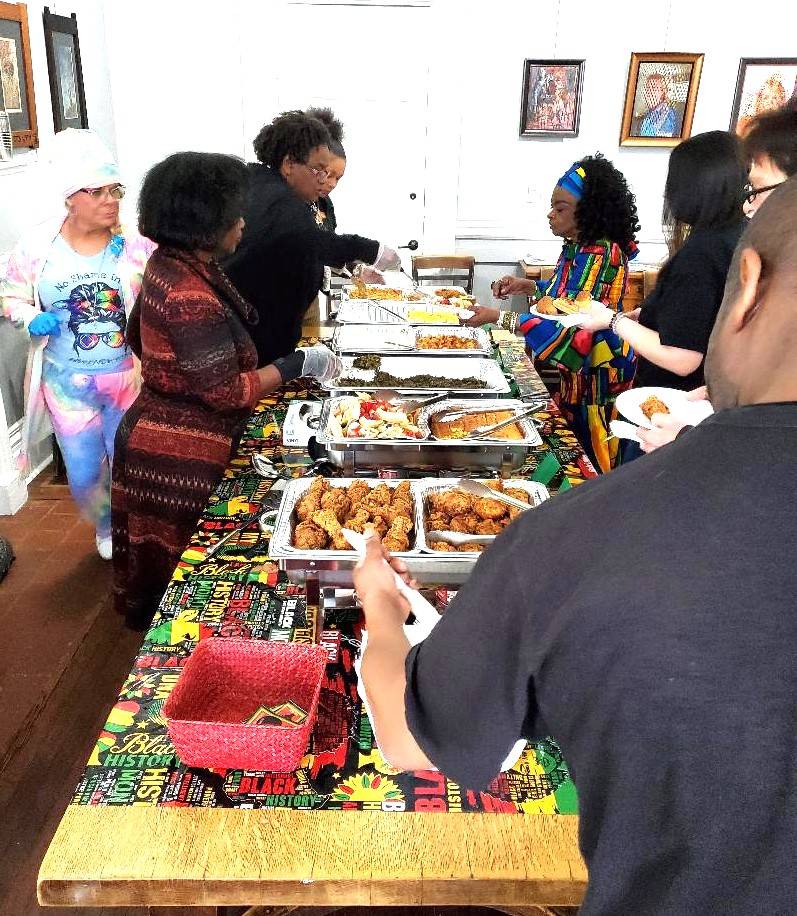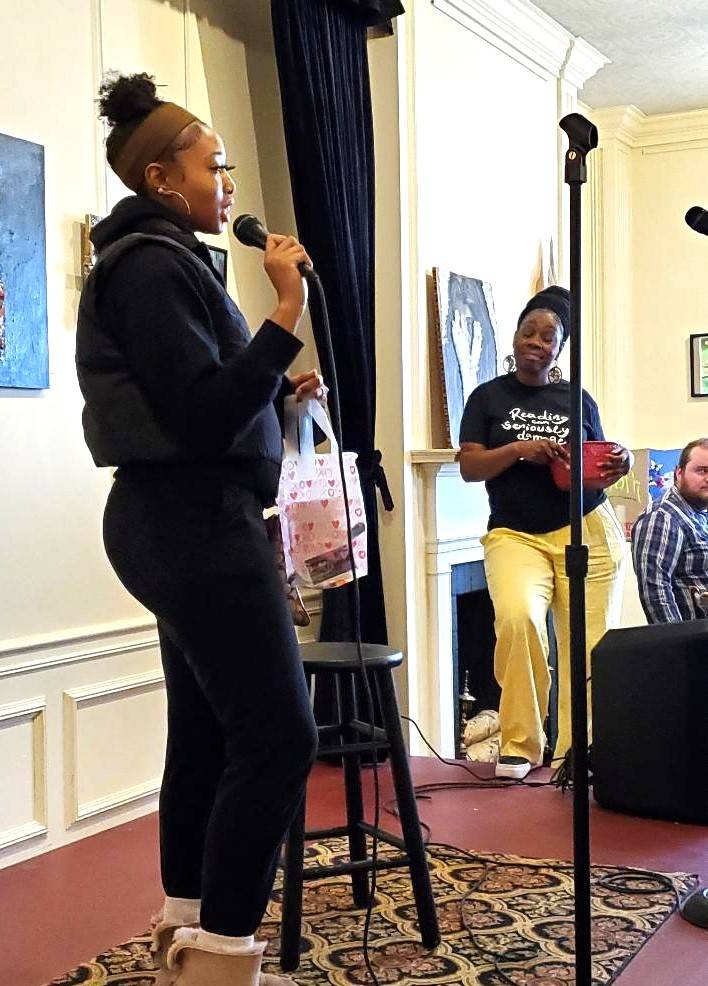
Photo by Mike Pettinella.
The first Soul Food Brunch at GoArt! on Tuesday afternoon provided both tasty African-American cuisine and some honest food for thought.
The gathering at East Main and Bank streets drew about 60 people, including members of Genesee County’s Black-owned businesses that were featured on a flyer handed out to the attendees.
After enjoying a menu of fried chicken and waffles, shrimp and grits, eggs, greens, macaroni and cheese, banana pudding and lemon pound cake, many of the attendees stuck around for a brief presentation led by brunch organizer Kenyetta Reese, a case manager at UConnectCare.
While the event was set up to highlight Black History Month, Reese noted that she and her family have been subjected to racism in recent months and years.
“I’ve actually experienced racism in the past six months,” she said. “So, if you could raise your hand here if you have also experienced racism in the past six months? How about in the past 30 days?”
Several people raised their hands.
Reese said recent events “have stirred up some trauma that she had from all of the hockey seasons that I was quiet.”
RECOUNTING INSTANCES OF RACISM
“My presence was loud, but I was somewhat quiet,” she recalled. “So, this event is for my son. He’s somewhere in this building.
“For every single time he was called the N-word on the ice, from the stands, for every unnecessary penalty, for the time parents called the police on him for checking their kid into the boards. Yes, someone actually called the police.”
She said her son was kicked out of games “for no reason.”
“For every game he cried, and I didn’t know. This event is for him, and I will no longer be quiet. His time is right now,” she said to applause.
Reese said that blatant racism is dismissed or disregarded.
“Microaggressions or exclusionary behaviors, if you will, boldly still exist and live hard for people of color still in 2024,” she offered. “With that said, we are here to celebrate Black History Month by sharing knowledge and a meal. Most importantly, to celebrate one another with two allies of our community and our workplace.”
She encouraged attendees to meet someone new today as “there’s a lot of power and strength in this room and in this building right now.”
MENTAL HEALTH TREATMENT IS LACKING
Reese’s daughter, Tzyonah, took the stage, providing statistics pertaining to Black people and mental health.
“Did you know that 63 percent of black people believe that a mental health condition is a sign of personal weakness?” she said. “People may experience shame about having a mental illness and worry that they may be discriminated against due to a condition.
“Nearly 90 percent of Black and African American people over the age of 12 with a substance use disorder did not receive treatment.
"In 2018, 58 percent of Black and African-American young adults with serious mental illness did not receive treatments.
"According to the APA (American Psychological Association), only 4 percent of psychologists are African-American. African American adults are 20% more likely to experience mental health issues than the rest of the population.
"Twenty-five percent of African-Americans seek treatment for a mental health issue compared to 40 percent of White individuals.”
Tzyonah said that she “struggles with” mental health issues … but continues to “work on myself and I continue to grow.”
“I remain so unbelievably vibrant, positive, resilient, strong, independent, hardworking.”
She said her custom printing business, Made by Tzy, provides her with a creative outlet “that brings me joy.”
“It gives me a voice and a platform to create dialogue and showcase the beauty, triumph and struggle of the Black experience through my art.”
THE MOORS: AHEAD OF THEIR TIME
From there, Brandon Armstrong, owner of the first Black-owned barber shop in Genesee County – Royals at 317 Ellicott St., Batavia, took a few minutes to talk about the Moors, African people around the 700s AD that, in his words, “were very smart and civilized back in those days.”
“They were well-studied in science and math … and they ushered in like a renaissance era,” he said. “Europe was very uncivilized. They weren’t bathing; there was a lot of sickness, a lot of diseases, and they were living with their animals.”
Armstrong said the Moors “came in with medicine – rubbing alcohol, disinfectant, soap – and showed the people how to groom themselves and bathe. They brought them clothing.”
He mentioned that the Moors originated the famous Italian dress shoe, the Moorigator.
“If you just look at that the word Moori, it’s a variation of the word Moorish. Right? And then if you look at the gator, the gator isn't indigenous to Italy, right? So, we see the black influence, even to this day, down to the shoes and from African culture.”
GOART! TO CREATE ‘BLACK SPACE’
GoArt! Executive Director Gregory Hallock followed Reese by announcing the agency has received a grant from BlackSpace, a New York City-based nonprofit collective of planners, architects, artists and designers devoted to creating spaces in communities to shine a light on Black culture and creativity.
He said he has scheduled a gathering at 6 p.m. March 11 at GoArt! for people to share ideas with architects for the new space.
“So, a space that we're digging down is available for us to do what we want to it, because it's not historic,” Hallock said, speaking of plans to install two art studios/classrooms, wood workshop, storage room, gallery and other amenities in the building’s basement. “It will become historic once it’s finished.”
Cathy Mack, a GoArt! director said most in the Black community aren’t aware of the programs that are available and encouraged those citizens to make reservations to attend the meeting and provide their input.
Hallock also reported that the agency is collaborating with another nonprofit to build a new 18,000-square-foot space in Medina that will include galleries, a podcast studio, a film studio, artisan shops, a music studio, artist-in-resident spaces, art classrooms and a music garden.


